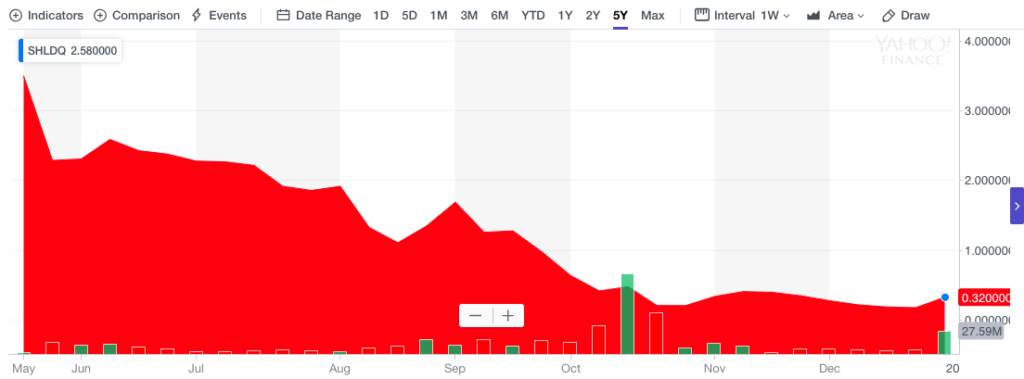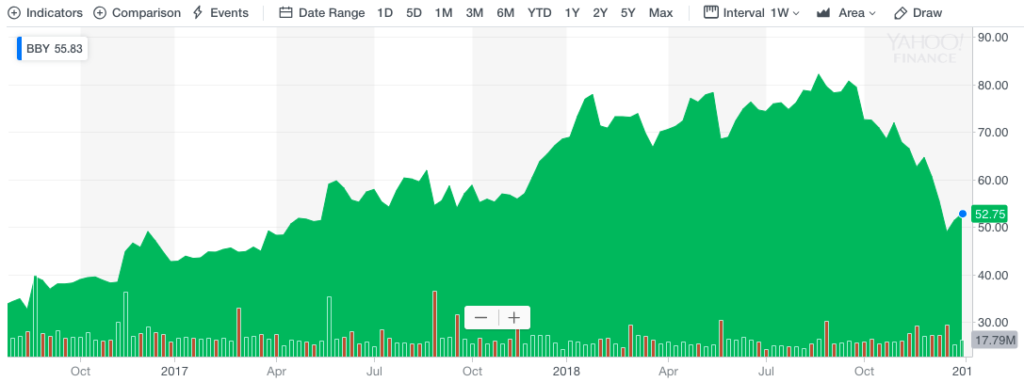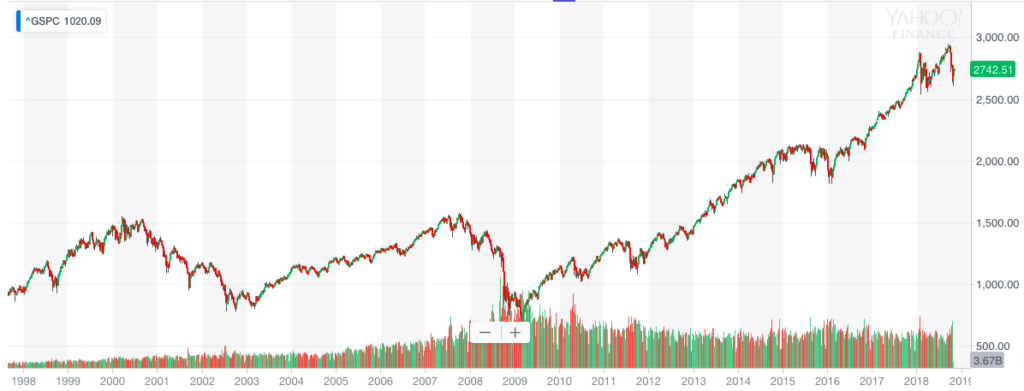With the recent stock market decline, many are short selling stocks to cash in on the downturn.
Should you join them? Short selling can help normalize returns during market downturns, but your losses could be infinite. Below is how to short a stock, as well as the pros and cons of doing so.

What is Short Selling?
Short selling is betting that a stock will decline in value. A “short” position is the opposite of a “long” position, which is betting that a stock will increase in value.
Short sellers borrow shares from someone, and sell the shares at their trading price. The goal is to buy the shares back at a lower price in the future, and profit from the difference.
An Example of Shorting a Stock
Imagine 5 years ago you thought Sears was going out of business. Back then, Sears was trading for $3.50 per share. You decide that this business is done, and want to short them into the ground for $14,000.
To short Sears for $14,000, you borrow 4,000 shares ($14k / $3.50 = 4k) and sell them to the open market. Then, you wait for their inevitable doom. During this time, you’re paying interest for borrowing those shares. The interest ranges based on how much the company is being shorted. To keep this simple, let’s suppose the interest rate is nothing.
How have you done? Sears filed for Bankruptcy in October 2018, which is great news for your short. The stock is now trading for roughly 30 cents per share. Even though they filed for bankruptcy, the shareholders may be saved due to restructuring. Investors aren’t terribly optimistic with this low of a price though.

Although the company could go to zero, the price could shoot up if the court allows them to restructure. Why risk it? Let’s redeem that short and cash in.
Remember, you only borrowed 4,000 shares, so that’s all you have to return. Those 4k shares are now worth $1,200 (4k * $0.30 = $1.2k). You spend twelve hundred bucks and pay back those 4k shares. During those 5 years, you made $12,800 for a 91% return. This works out to over 18% per year, not a bad move!
Pros of Short Selling
The Pros of shorting a stock are crystal clear. If you find an overvalued company, or an overvalued industry that’s about to be disrupted, you can make a killing. Many saw the retail apocalypse on the horizon, and those who bet against Sears made a great return.
Shorting also helps reduce volatility in your portfolio. Markets move in cycles, and nobody knows when markets trend up or trend down. If you find companies that could go down, you could minimize losses if the entire market goes down. Your longs will be cushioned by your shorts.
Cons of Shorting a Stock
With the obvious pros of shorting stocks, why would anybody not do it? In short, you don’t make as great of a return, and you could lose everything.
You could lose everything
Many saw the retail apocalypse coming, and make a killing shorting Sears. What if you shorted Best Buy instead? Amazon is disrupting the electronics business, and many felt Best Buy was left for dead five years ago.
Best Buy was trading for $32 per share five years ago, and is currently trading for $53. If you shorted the same $14k for Best Buy, you would have lost $9,188 for a 66% loss!

As bad as a 66% loss sounds, it could have been much worse. At Best Buy’s peak of $82 per share, your $14k short was down $21,875 for a 156% loss.
That’s the deal with shorting – your gain is finite, you can only make as much as short. Your losses could be infinite if you’re wrong.
Should You Short a Stock?
I have never shorted a stock, and recommend that you don’t short either. No matter how successful your investments are, you can lose everything if you’re wrong on a short.
Even the brightest hedge fund managers are getting killed on their shorts. David Einhorn of Greenlight Capital has lost billions thanks to shorting Amazon and Tesla. If the best and brightest are losing a ton off of shorting, we recommend that you stay away.
If you do short a stock, make sure you don’t hold on for it that long. Stocks go up a lot more than they go down. Here’s a graph of the S&P 500 over the last 20 years. If you shorted most of these companies long enough, you would have lost everything.

Is Selling Short Immoral?
Many have criticized shorts for manipulating stock prices down Elon Musk famously called out shorts in October 2018.
Exactly. Short-sellers are value destroyers. Should definitely be illegal.— Elon Musk (@elonmusk) October 4, 2018
Elon’s logic makes no sense whatsoever. Short sellers play a valuable role in the markets by keeping inflated stock prices in check.
Elon has sold the vision of his stock at an incredibly high valuation, and has used that value to get more debt and sell more stock to help Tesla’s cash position. If he is able to sell why his stock should be worth more, sellers should be able to sell why the stock should be worth less.
If short sellers don’t have an incentive to find over valued companies, companies would have nothing keeping them in check. They could spin whatever story they want to increase their stock price.
Short sellers are taking infinite risk to police the stock market. They’re a valuable part of the market, even though I would never personally do it.
Short Selling – The Bottom Line
Shorting stocks are a great way to bet on companies that are overvalued or are getting disrupted. By betting on stocks to go down, you’re also hedging your portfolio from future stock market downturns.
With that said, the risks to shorting a stock are limitless. If you’re wrong, you could wipe out your entire portfolio. In general, most companies go up over the long run. Make sure your bets are small and concentrated, and don’t hold on to shorts for too long.